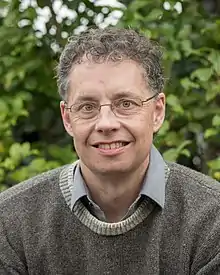Carl Bergstrom
Carl Theodore Bergstrom is a theoretical and evolutionary biologist and a professor at the University of Washington in Seattle, Washington.[3] Bergstrom is an outspoken critic of low-quality or misleading scientific research.[4] He is the co-author of a book on misinformation called Calling Bullshit: The Art of Skepticism in a Data-Driven World and teaches a class by the same name at University of Washington.[5]
Carl Bergstrom | |
|---|---|
 | |
| Born | Carl Theodore Bergstrom |
| Education | |
| Known for | Eigenfactor[1] Disinformation dynamics |
| Spouse(s) | Holly Ann Bergstrom[2] |
| Scientific career | |
| Institutions | University of Washington |
| Thesis | Game-theoretic models of signalling among relatives (1998) |
| Doctoral advisor | Marcus Feldman[2] |
| Website | ctbergstrom |
Education
Bergstrom completed his Ph.D. at Stanford University under the supervision of Marcus Feldman[2] in 1998.
Research
Bergstrom's work concerns the flow of information through biological and social networks,[6] as well as, the ecology and evolution of pathogenic organisms, including the development of resistance.[7][8][9][10][11][12]
He is the coauthor (with Lee Dugatkin) of a college textbook, Evolution.[13] With Jevin West, he developed the popular course and website Calling Bullshit.[14][15][16][17][18][19] His work has led to the identification of him as a resource to explain the dynamics of disinformation and misinformation,[20] in general.
In addition to evolutionary biology, Bergstrom's interests include the ranking of scientific journals. In 2007, he introduced the Eigenfactor,[1] metrics for journal ranking.[21] This and related work on open access earned him and his father, Ted Bergstrom, the SPARC Innovator Award in June 2007.[22]
See also
References
- Bergstrom, C. T.; West, J. D.; Wiseman, M. A. (2008). "The Eigenfactor™ Metrics". Journal of Neuroscience. 28 (45): 11433–11434. doi:10.1523/JNEUROSCI.0003-08.2008. PMC 6671297. PMID 18987179.
- Bergstrom, Carl (1998). Game-theoretic models of signalling among relatives (PhD thesis). Stanford University.
- Carl Bergstrom publications indexed by Google Scholar
- Simonite, Tom (24 March 2020). "The Professors Who Call 'Bullshit' on Covid-19 Misinformation". Wired. Retrieved 5 May 2020.
- "Calling Bullshit". Penguin Random House. Retrieved 5 May 2020.
- Bergstrom, C. T.; Lachmann, M. (2006). "The fitness value of information". Oikos (Copenhagen, Denmark). 119 (2): 219–230. arXiv:q-bio.PE/0510007. doi:10.1111/j.1600-0706.2009.17781.x. PMC 4384894. PMID 25843980.
- Antia, R.; Regoes, R. R.; Koella, J. C.; Bergstrom, C. T. (2003). "The role of evolution in the emergence of infectious diseases". Nature. 426 (6967): 658–661. Bibcode:2003Natur.426..658A. doi:10.1038/nature02104. hdl:1773/1985. PMC 7095141. PMID 14668863.
- Levin, B. R. (2000). "Bacteria are different: Observations, interpretations, speculations, and opinions about the mechanisms of adaptive evolution in prokaryotes". Proceedings of the National Academy of Sciences. 97 (13): 6981–6985. Bibcode:2000PNAS...97.6981L. doi:10.1073/pnas.97.13.6981. PMC 34373. PMID 10860960.
- Bergstrom, C. T. (2004). "Ecological theory suggests that antimicrobial cycling will not reduce antimicrobial resistance in hospitals". Proceedings of the National Academy of Sciences. 101 (36): 13285–13290. Bibcode:2004PNAS..10113285B. doi:10.1073/pnas.0402298101. PMC 516561. PMID 15308772.
- Lipsitch, M.; Bergstrom, C. T.; Levin, B. R. (2000). "The epidemiology of antibiotic resistance in hospitals: Paradoxes and prescriptions" (PDF). Proceedings of the National Academy of Sciences of the United States of America. 97 (4): 1938–1943. Bibcode:2000PNAS...97.1938L. doi:10.1073/pnas.97.4.1938. PMC 26540. PMID 10677558.
- Rosvall, M.; Bergstrom, C. T. (2008). "Maps of random walks on complex networks reveal community structure". Proceedings of the National Academy of Sciences. 105 (4): 1118–23. arXiv:0707.0609. Bibcode:2008PNAS..105.1118R. doi:10.1073/pnas.0706851105. PMC 2234100. PMID 18216267.
- Rosvall, M.; Bergstrom, C. T. (2007). "An information-theoretic framework for resolving community structure in complex networks". Proceedings of the National Academy of Sciences. 104 (18): 7327–31. arXiv:physics/0612035. Bibcode:2007PNAS..104.7327R. doi:10.1073/pnas.0611034104. PMC 1855072. PMID 17452639.
- Dugatkin, L. A.; Bergstrom, C. T. (2011). Evolution. New York: W. W. Norton & Company. ISBN 978-0-393-92592-0.
- McWilliams, James (2019-04-17). "'Calling bullshit': the college class on how not to be duped by the news". The Guardian. ISSN 0261-3077. Retrieved 2019-10-08.
- Guarino, Ben. "Misinformation is everywhere. These scientists can teach you to fight BS". Washington Post. Retrieved 2019-10-08.
- Nijhuis, Michele (2017-06-03). "How to Call B.S. on Big Data: A Practical Guide". The New Yorker. Retrieved 2019-10-08.
- Bouygues, Helen Lee. "Why We Need To Think Critically About Data". Forbes. Retrieved 2019-10-08.
- McFarling, Usha Lee. "This college course teaches you how to call out things that are unscientific". Business Insider. Retrieved 2019-10-08.
- Kolowich, Steve (2017-01-16). "The Fine Art of Sniffing Out Crappy Science". The Chronicle of Higher Education. ISSN 0009-5982. Retrieved 2019-10-08.
- Bellware, Kim, The coronavirus is spreading rapidly. So is misinformation about it., The Washington Post, February 10, 2020
- Bergstrom, C. T. (May 2007). "Eigenfactor: Measuring the value and prestige of scholarly journals". College & Research Libraries News. 68 (5): 314–316. doi:10.5860/crln.68.5.7804.
- "SPARC Innovators: Ted Bergstrom and Carl Bergstrom (June 2007)". SPARC. Archived from the original on 2011-08-19.
External links
- Carl Bergstrom page at Sante Fe
- Carl Bergstrom publications indexed by Google Scholar